You must be thinking, “Why does Bored Panda have a list of Terrible Puns?” and “If these puns are funny, why would they be termed terrible?” Hear us out before you jump to any conclusions!
You’re surely acquainted with the expression, “So bad, it’s good.” It’s a way of saying something is so remarkably bad that you find yourself speechless and hypnotized by its lame energy. So, what does this have to do with puns?
The best puns are terrible. Not just bad. Terrible. Some people think puns are the lowest form of humor, but they’re wrong. Puns are the funniest thing ever invented by a man (or woman). They’re the definition of “so bad that they’re good.”
Today, we gave it our worst, though. The terrible puns in this list are of the poorest type, like the most stupid dad jokes you could think of. And yet, they have so much cringeworthy energy and enthusiasm behind them that you can’t help but be drawn in and enjoy their absurdity, even if you’re aware you’re not supposed to find them funny if you have any sanity left!
Beware: If you’re gonna laugh because of them, it means your humor is utterly broken. And that’s totally ok; you’re still cool to us. So sit back and laugh out loud at this selection of terrible jokes that are funny, cringy, lame, and yet enjoyable!
Collection of Really, Like Really Bad Puns
Bad puns, jokes, and memes must definitely be your cup of tea if you scrolled down here! Well then, we no longer want to keep your broken sense of humor waiting! Let’s begin, shall we?
This post may include affiliate links.
Dad’s Side Hustle Exposed
 I never wanted to believe that my Dad was stealing from his job as a road worker. But when I got home, all the signs were there.
I never wanted to believe that my Dad was stealing from his job as a road worker. But when I got home, all the signs were there.
Abracadogbra, Anyone?
My dog can do magic tricks. It's a labracadabrador.
Well, That Escalated Quickly
I lost my job at the bank on the very first day. A woman asked me to check her balance so I pushed her over.
When life gives you left limbs, make right jokes
Did you hear about the guy who had his left leg and his left arm amputated in a car accident? He's all right now.
Dad jokes hitting different today
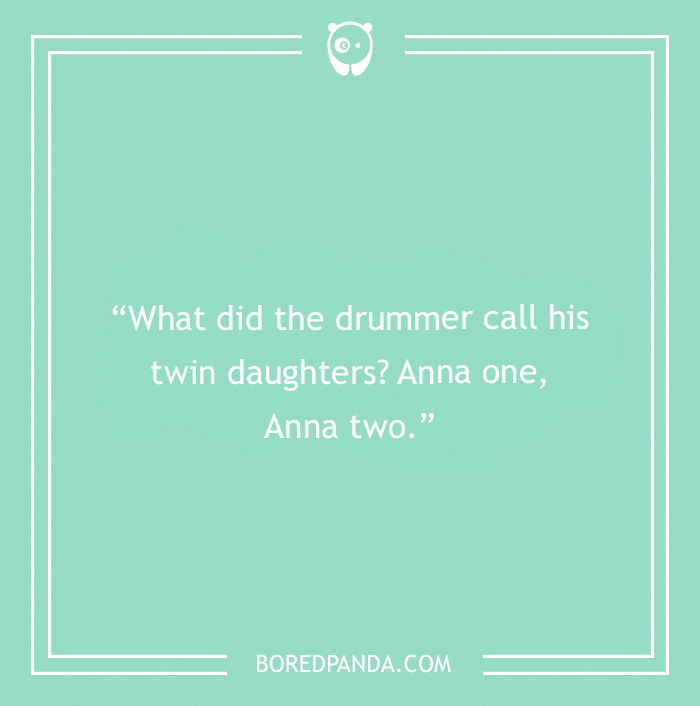 What did the drummer call his twin daughters? Anna one, Anna two.
What did the drummer call his twin daughters? Anna one, Anna two.
My parents liked watching The Lawrence Welk Show when i was growing up, so I totally heard the punchline in my head with his voice. LOL
Whistles That Whistle... Not
I bought a wooden whistle, but it wooden whistle. So I bought a steel whistle, but it steel wooden whistle. So I bought a lead whistle, but it steel wooden lead me whistle.
Spiders Are Just It Pros Now
Why did the spider log on to the computer? To check his web site.
His best frenemy had just texted him saying it was down, and he knew it would bug him all day if he didn't check it!
The spice rack hit peak expiration
I had to clean out my spice rack and noticed that everything was too old and had to be thrown out. What a waste of thyme.
Objet trouvé: French gamer vibes
I asked a Frenchman if he played video games. He said Wii.
I asked a German guy if he did and he told me played 9. I didn't even know there that many consoles out right now!
Toddlers: The Real Crime Bosses
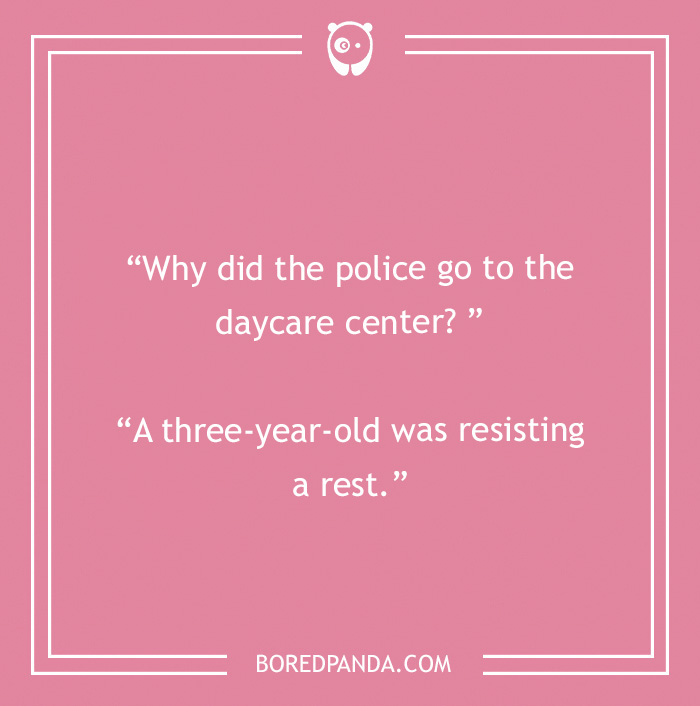 Why did the police go to the daycare center? A three-year-old was resisting a rest.
Why did the police go to the daycare center? A three-year-old was resisting a rest.
And here I was hoping for a pun that involved that old 90's movie kindergarten cop!
When your closet is basically a fantasy novel
I asked the lion in my wardrobe what he was doing there. He said it was Narnia business.
Now that\'s a snappy crime solver
What do you call an alligator in a vest? An investigator.
What do you call an alligator who hates men? A castigater. What do you call an alligator initiates trouble? An instigator. What do you call an alligator who pleasures himself? A masturgator.
Rollin’ like it’s magic
What's Harry Potter's favourite way to get down a hill? Walking... JK, Rolling.
Well, That Escalated Quickly
I was sitting in traffic the other day. Probably why I got run over.
I would have moved but I was just so distracted watching this chicken cross the road...
Shockingly Clear Moments
 I was struggling to figure out how lightning works. Then it struck me.
I was struggling to figure out how lightning works. Then it struck me.
Eye see what you did there
What did the left eye say to the right eye? "Between us, something smells."
Moo-ving Origins Revealed
Where do milkshakes come from? Nervous cows.
No, you have to wait for an earth quake if you want organic but any of those exercise belts they used to use in the 50's will do if your okay with nonorganic
Dessert Bites Back
What do you get if you cross a snake with a pie? A pie-thon.
Who knew creepy crawlies could chat?
What do you get when you cross a centipede with a parrot? A walkie talkie.
Waves of Carbonation Feels
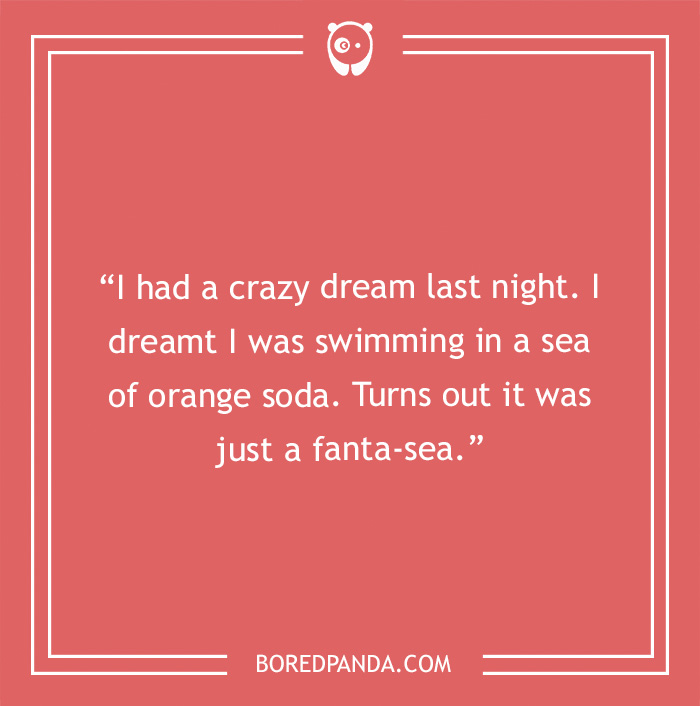 I had a crazy dream last night. I dreamt I was swimming in a sea of orange soda. Turns out it was just a fanta-sea.
I had a crazy dream last night. I dreamt I was swimming in a sea of orange soda. Turns out it was just a fanta-sea.
I got a rousing speach during a storm that got all the sailors working together. It was a pep-sea!
Unexpected pasta engineering skills
I told my friend I was going to make a bike out of spaghetti. You should have seen her face when I rode straight pasta.
Magic math skills on point
A Mexican magician told his audience he would disappear on the count of three. He wrapped his cape around himself and began to count. "Uno… Dos…" and then POOF, he disappeared without a Tres.
Goalies Keep It Real
Why should you never break up with a goalie? Because he's a keeper.
Leaf me here cracking up
What kind of tree fits in your hand? A palm tree.
When life hands you max volume deals
 I saw an ad that said "television for sale, $1, volume stuck on full" and I thought to myself, I can't turn that down.
I saw an ad that said "television for sale, $1, volume stuck on full" and I thought to myself, I can't turn that down.
After watching a fix it video on YouTube with earmits on, he enjoyed his 90 inch OLED curved screen for only $1
I see what you did there
What did the pony say when he had a sore throat? "Do you have any water? I'm a little horse."
Kernel of a joke right there
What did the baby corn say to the mama corn? "Where is pop corn?"
"He went out for butter, son." "But mama, he has been gone for 10 years now!" 😭
Low-key missing my shot
I wanted to take a picture of the fog this morning but I mist my chance. I guess I could dew it tomorrow.
Peak doctor humor right there
"Doctor, there’s a patient on line one that says he’s invisible." "Well, tell him I can’t see him right now."
But only when I'm naked and no one is looking at me and I'm not looking at myself
More Bad Puns and Jokes to Tell Your Friends
Those were really the worst ones, weren’t they? Need some more awful humor? Well, lucky for you, we have over 160 more waiting just for you. Read on then and share them with your friends who enjoy terrible memes just as much as you do!
I see what you did there
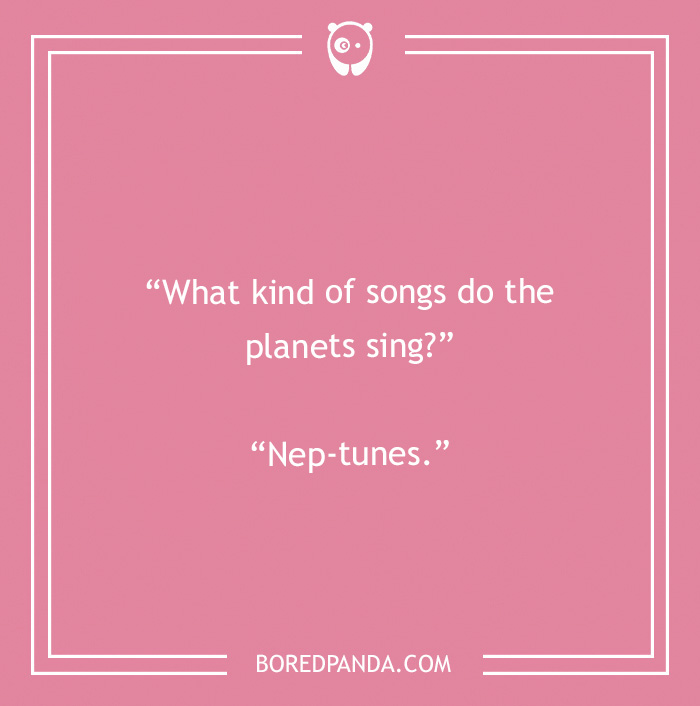 What kind of songs do the planets sing? Nep-tunes.
What kind of songs do the planets sing? Nep-tunes.
Spotted and totally exposed
Why can't a leopard hide? Because he's always spotted.
This Bee Can’t Decide Either
What do you call a bee that can't make up its mind? A maybe.
Well, that escalated quickly
I used to be a tap dancer, until I fell in the sink.
Vintage pirate vibes, still sailing strong
 What did the pirate say on his 80th birthday? Aye matey.
What did the pirate say on his 80th birthday? Aye matey.
Well Played, Photo Crime
How did the picture end up in jail? It was framed.
Classic dad joke energy
What did the fish say when he swam into a wall? Dam.
Jurassic Parking Fails
What do you get when two dinosaur crash their cars? A T-wrecks.
Unfortunately this does happen a lot, those tiny arms are not condusive to safe driving 😔🦖
Classic Dad Joke Energy
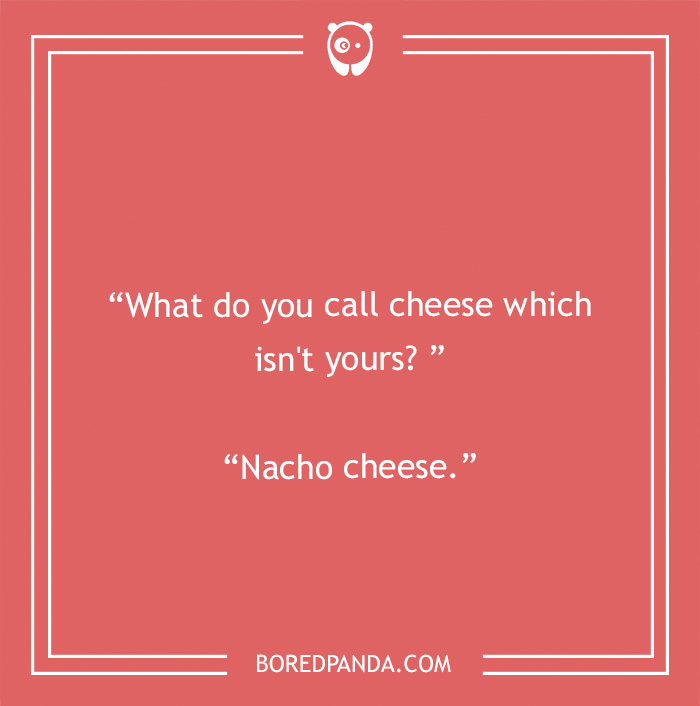 What do you call cheese which isn't yours? Nacho cheese.
What do you call cheese which isn't yours? Nacho cheese.
Ron-stoppable Humor Hits Different
"Why don't I get my friends 'Harry Potter' jokes?" "Because there is something Ron with you."
Here I was thinking this joke was going to be the one that could not be told :-/
That Joke Didn\'t Age Well
My friend made a joke about the TV controller. It wasn't remotely funny.
Pun Intended, Clearly
Once, there was a lumberjack who wandered into a magical forest. As he swung his axe at a tree, the tree said "don’t cut me down, I’m a talking tree!" The lumberjack replied, "and you will dialogue."
Taxidermist’s first aid kit?
Why did the cat go to medical school? To become a first aid kit.
Moodier Than Your Monday
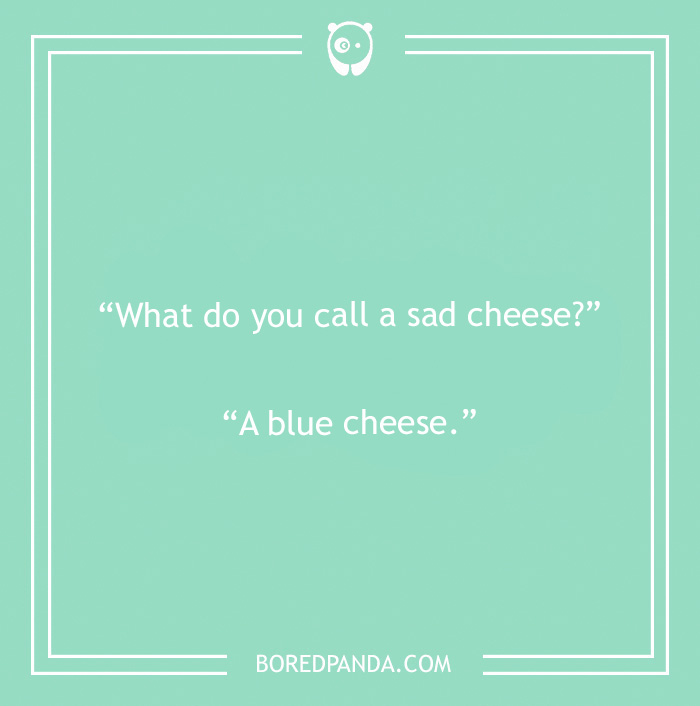 What do you call a sad cheese? A blue cheese.
What do you call a sad cheese? A blue cheese.
Ketchup on that burn
What did the waiter say when he dropped a hotdog? It could have been wurst.
I once traded a sausage for a sea bird... I took a tern for the wurst. I'll see myself out now!
Classic dad joke energy
What's an astronaut's favourite part of a computer? The space bar.
This pun’s too fresh to handle
How does a scientist freshen her breath? With experi-mints.
Houston, We’ve Got a Pun
 How do you throw a party in space? You planet.
How do you throw a party in space? You planet.
Dad joke energy, but I’ll allow it
How does the moon cut his hair? Eclipse it.
Hey, Eclipsed my car the other day, the moon shouldn't be cutting his hair and driving!
X-Ray Techs Don’t Miss Much
Never lie to an x-ray technician. They can see right through you.
Pun game: teacher edition
Why did the teacher wear sunglasses to school? Because her students were so bright.
Explains why my teacher had so many lights pointed my way 😭😂😭
Well, That Took a Twist
Bobby broke his finger today, but on the other hand he was completely fine.
Death by pun is still a win
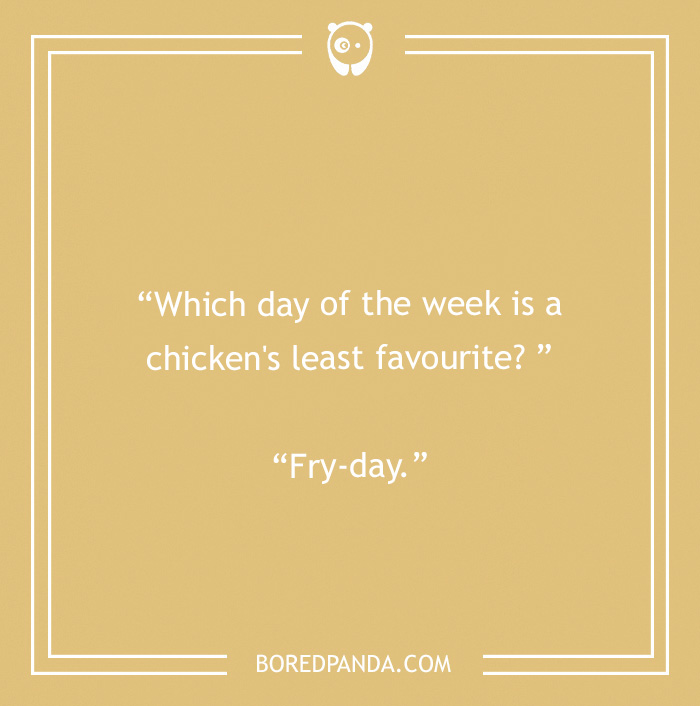 Which day of the week is a chicken's least favourite? Fry-day.
Which day of the week is a chicken's least favourite? Fry-day.
No, it's the first day back to work. Whatever that day might be. For me Wednesday
Classic dad joke energy
What did the teacher say when the horse walked into the class? Why the long face?
Practice makes perfect, even if you’re hanging upside down
Learning to sleep upside down is hard for bats, but eventually they get the hang of it.
Kneading a Better Greeting
What does the baker always say to his customers? Do you oven come here?
Do you oven care this makes no sense Dave? Did you even think about that Dave? Did you Dave?
Guess the Moon’s Restaurant Vibe
Did you hear about the restaurant on the moon? I heard it was good but it had no atmosphere.
Classic Dad Joke Energy
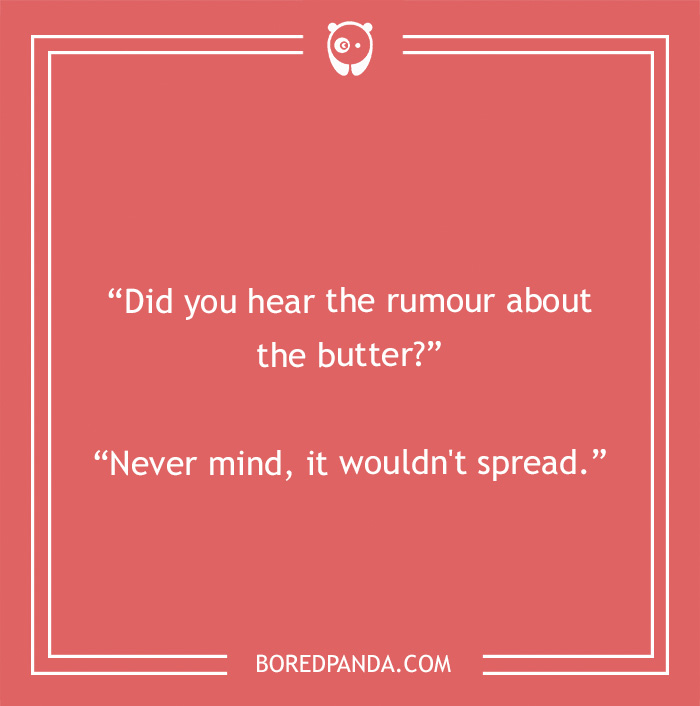 Did you hear the rumour about the butter? Never mind, it wouldn't spread.
Did you hear the rumour about the butter? Never mind, it wouldn't spread.
See mayo is a spread just like butter! I maintain the other joke about it being dressing makes no sense!
Salsa: Testing the Dip Waters
I wanted to learn to dance so I started with salsa. I wanted something I could dip in to.
Time’s up and so am I
I've just been fired from a clock factory, even after all those extra hours I put in.
Low-key the hottest pickup line
What did one volcano say to the other? I lava you.
Elf-abet Class: Nailed It
What do elves learn in school? The elf-abet.
Speed Bumps? Still Sneaking Up On Me
 I have a speed bump phobia, but I'm slowly getting over it.
I have a speed bump phobia, but I'm slowly getting over it.
Planetary pickup lines hitting different
What did Mars say to Saturn? "Give me a ring sometime."
Small problem, big patience
"Doctor, doctor, help! I think I'm shrinking!" "Take this and you’ll be back to normal in a few weeks. Until then, you’ll just have to be a little patient."
Udderly Punny Night Out
Where do cows go for entertainment? To the moo-vies.
Yeah but they don't go for the normal snacks while there. All they bring are cow pies.
Not your average vampire vibes
 What has fangs and webbed feet? Count Duckula.
What has fangs and webbed feet? Count Duckula.
Detective Duck’s Greatest Hit
What was the goal of the detective duck? To quack the case of course.
One Tail, No Plot Twist
Why are all dogs bad storytellers? Because they only have one tale.
What if it's a whale of a tale that goes beyond the pale and is overall without compare? Would you say it's a tale there?
I See What You Did There
What happens when it's raining cats and dogs? I don't know but you can step in a poodle.
You Don’t See a Cheese Walk Into Bars Everyday
A cheese sandwich walks into a bar. The waiter says, "we don't serve food here."
Time to snack, apparently
What did the clock do when he was hungry? He went back four seconds.
Classic Dad Joke Energy
What type of candy is never on time? Choco-late.
Lettuce Keep It Cool
What did the mayonnaise say when somebody opened the refrigerator? Hey, close the door, I'm dressing!
No, that was the ranch. Mayo is a spread, it was in the middle of the splits at the time.
Soft drink saves the day
 Did you hear about the guy who got hit in the head with a can of soda? He was lucky it was a soft drink.
Did you hear about the guy who got hit in the head with a can of soda? He was lucky it was a soft drink.
This Pun Deserves a Toast
Did you hear about the antiques collector who found an old Coca Cola lamp? She was soda lighted.
Im-pasta? Classic dad move.
What do you call a fake noodle? An im-pasta.
Mushroom Space Matters
How much room should you give fungi to grow? As mushroom as possible.
This Joke’s Got a Boomerang Vibe
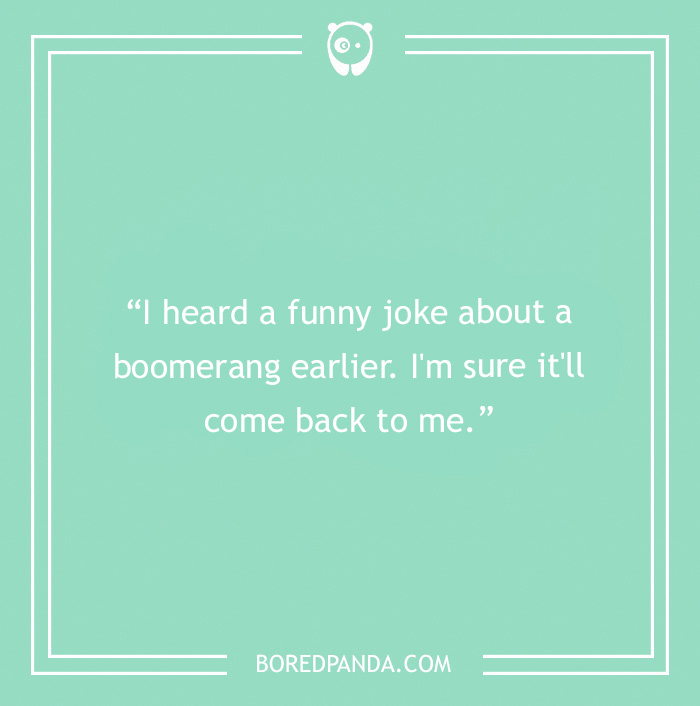 I heard a funny joke about a boomerang earlier. I'm sure it'll come back to me.
I heard a funny joke about a boomerang earlier. I'm sure it'll come back to me.
Mind-Blown by a Flying Disc
I used to wonder why frisbees looked bigger the closer they got. Then it hit me.
Finally, a puppet with boundary issues
Broken puppets for sale. No strings attached.
Pun intended, obviously
Why don't you interrupt someone working on a puzzle? You'll hear some crosswords.
Snack time’s secretly a sport too
 Why are basketball players such messy eaters? Because they’re always dribbling.
Why are basketball players such messy eaters? Because they’re always dribbling.
Nosey Neighbors, Beware
What did the nose say to the finger? Quit picking on me.
Ear-resistibly cheap, matey!
How much does it cost a pirate to gets his ears pierced? About a buck an ear.
Double the eraser, zero sense
Pencils could be made with erasers at each end, but what would be the point?
Victim of a Sneezy Bite
 How can you tell if a vampire has a cold? He starts coffin.
How can you tell if a vampire has a cold? He starts coffin.
Mind reader loading… please wait
I'm working on a device that reads minds. I'd love to hear your thoughts.
Sea you wave back
How can you tell if the ocean is friendly? It waves.
Cold but deadly humor
What do you get if you cross a vampire and a snowman? Frostbite.
Guess the Airline Wins Again
A man sued an airline company after it lost his luggage. Unfortunately he lost his case.
But won 4.9 billion dollars.max cap for liability was only $400 so it was reduced 😔
That’s one smelly verdict
 What did the judge say when the skunk came into the courtroom? "Odor in the court."
What did the judge say when the skunk came into the courtroom? "Odor in the court."
Tentacles of laughter
How many tickles does it take to make an octopus laugh? Ten tickles.
Low-key dino humor, don’t @ me
Why can't you hear a pterodactyl go to the bathroom? Because it's pee is silent.
Okay, that’s pawsome
 What's a cats favourite colour? Purrr-ple.
What's a cats favourite colour? Purrr-ple.
No one’s packing like this llama
What do you say to a Llama that loves picnicking? Alpaca lunch.
Batting a Thousand Laughs
What animal is at a baseball game? A bat.
Doesn't everyone know that? It's cuz their a class act! That's a fact.
Instant Squirrel Approval Hack
How do you get a squirrel to like you? Act like a nut.
Guess gravity’s got jokes today
How do you make a lemon drop? Just let it fall.
Fruit drama hits different
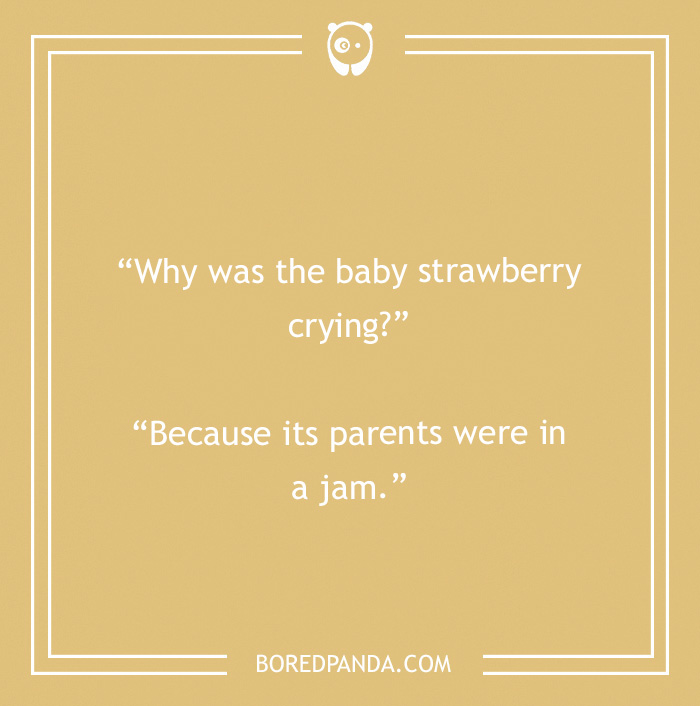 Why was the baby strawberry crying? Because its parents were in a jam.
Why was the baby strawberry crying? Because its parents were in a jam.
Saucy Pickup Line Energy
What did the pizza say to the beautiful topping? I never SAUsage a beautiful face.
Not Your Grandma’s Egg Roll Recipe
How do you make a good egg roll? You push it down a hill.
Peak dad joke energy
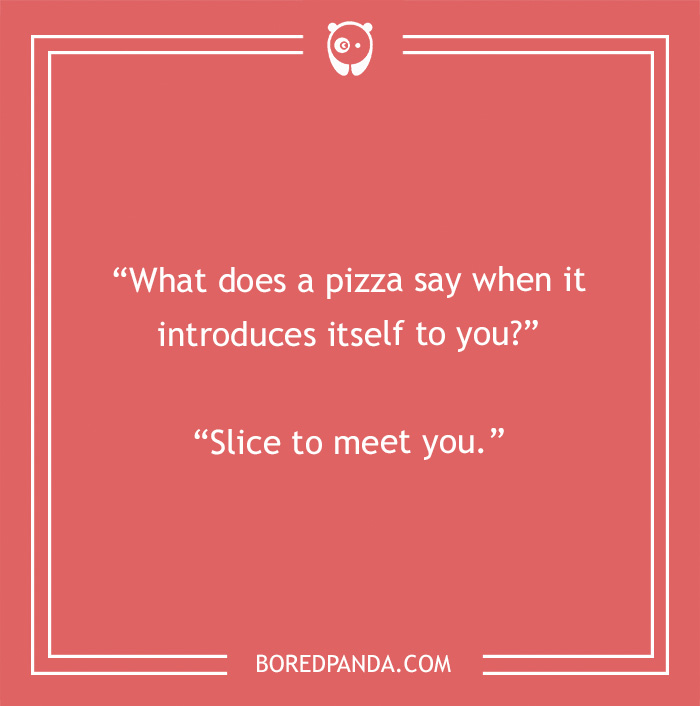 What does a pizza say when it introduces itself to you? Slice to meet you.
What does a pizza say when it introduces itself to you? Slice to meet you.
Batter’s Not Just For Cakes
What do cakes and a baseball have in common? They both need a batter.
Shelf-aware humor hits different
What did the librarian say when the books were a mess? We ought to be ashamed of ourshelves.
Plot twist: It’s the library
Which building in New York has the most stories? The public library.
Parenting, but make it cosmic
How do you stop an astronaut's baby from crying? You rocket.
Cornering the heat like a pro
If you ever feel cold just stand in a corner. They’re usually around 90 degrees.
Classic ghost teacher energy
What did the ghost teacher say to his class? "Look at the board and I will go through it again."
Official Doggo Snack Goals
 If your dog was craving pizza what kind of pizza would he want? Puperoni.
If your dog was craving pizza what kind of pizza would he want? Puperoni.
This Joke’s Trunk-ional
What do you get when you cross an elephant with a fish? Swimming trunks.
When Your Goals Are Literally Circular
 Why did the poor dog chase his own tail? He was trying to make both ends meet.
Why did the poor dog chase his own tail? He was trying to make both ends meet.
Tall problems, bigger distractions
Why did the giraffe get bad grades? Because he had his head in the clouds.
Best Pun You’ll Pretend You Didn’t Hear
What do you call a horse that lives next door? A neigh-bor.
Udderly Unexpected Blast
What noise do you hear when a cow breaks the sound barrier? Cowboom.
Now that’s dedication to the grind
 Why did the butcher do overtime last week? To make ends meat.
Why did the butcher do overtime last week? To make ends meat.
Homework tastes better than it sounds
Why did the student eat his homework? Because the teacher told him it was a piece of cake.
Classic fruit doctor moment
Why did the banana go to the doctor? Because it wasn't peeling well.
Chewing Through a Galaxy Far, Far Away
I went to a restaurant last night and had the Wookie steak. It was a little chewy.
This One’s a Real Dill
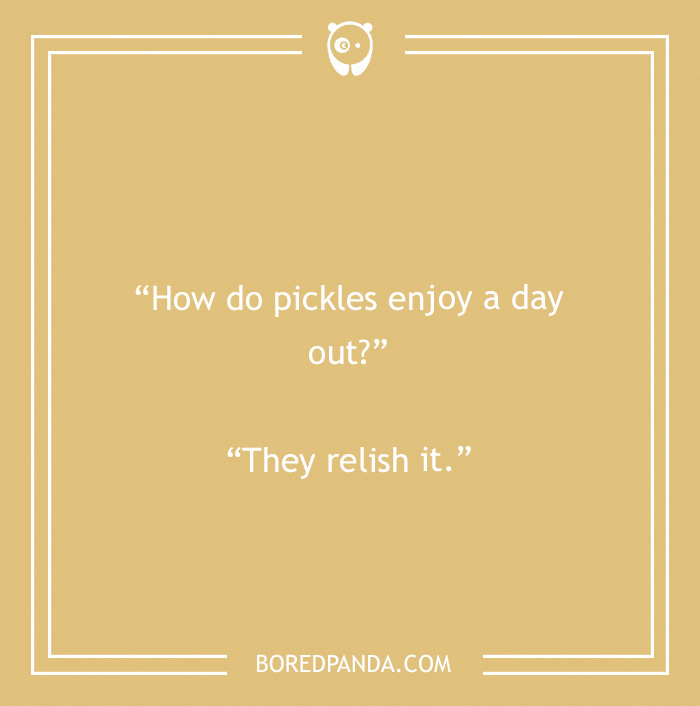 How do pickles enjoy a day out? They relish it.
How do pickles enjoy a day out? They relish it.
Why do pickles love family reunions? Because they relish their thyme together.
Salad’s saddest leftovers, honestly
What do you call those dead pieces of green stuff left in the bottom of a bowl of Caesar salad? The last romaines. Now lettuce pray for them.
Some jokes just brine themselves
Two pickles fell out of the jar onto the floor. What did one pickle say to the other? Dill with it.
Unexpected bathroom bandmate
 What musical instrument is found in the bathroom? A tuba toothpaste.
What musical instrument is found in the bathroom? A tuba toothpaste.
Putting the “Wind” in Metal
Two windmills are standing in a field and one asks the other, "what kind of music do you like?" The other says, "I’m a big metal fan."
Award-winning dad joke energy
What kind of award did the dentist receive? A little plaque.
Pointless, but they keep rolling
Do you want to know why I hate circles so much? They’re just so pointless, but I guess that’s how they roll.
Photosynthesis, but make it romantic
 What do you get when you give a plant kisses? Two lips.
What do you get when you give a plant kisses? Two lips.
Trash talk turned life hack
Learning to collect trash wasn't that hard. I just picked it up as I went along.
Santa’s Not So Jolly Crowd
What do you call people who are afraid of Santa Claus? Claus-trophobic.
Plot twist: thesaurus ran out of synonyms
I just bought a thesaurus from the book store, but when I got home all the pages were blank. There are no words to describe how angry I am.
Pee-yew, that roast stings!
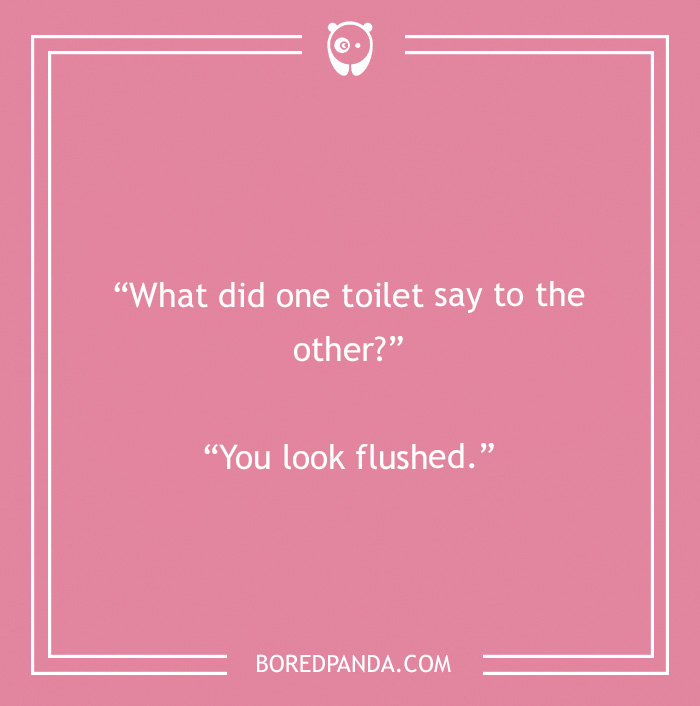 What did one toilet say to the other?
"You look flushed."
What did one toilet say to the other?
"You look flushed."
Still waiting for my debut in his brain
Today my son walked over and said "could I have a book mark"? I burst into tears. 11-years-old and he still doesn't know my name is Brian.
Flight goals: neverland edition
Why is Peter Pan always flying? He neverlands.
Ugh it's cuz he's lives in Neverland... Duh lol.. I'll give you an A for Affort tho...
That joke’s totally irrelephant
What did the elephant say when he stopped in the middle of telling a story? Never mind, I realize this is irrelephant.
I Did Not See That Coming
A weasel walks into a bar. The bartender says, "wow I've never served a weasel before, what can I get you?" "Pop", goes the weasel.
When You See It, You See It
A wife says to her husband that a moose is falling from the sky. The husband looks and says, it's just reindeer.
Reporters Know Their Flavors
What was the reporter doing in the ice cream shop? Getting the scoop.
Whispering? Not on this farm.
 Why shouldn't you tell a secret on a farm? Because the potatoes have eyes and the corn have ears.
Why shouldn't you tell a secret on a farm? Because the potatoes have eyes and the corn have ears.
Classic Dad Joke Energy
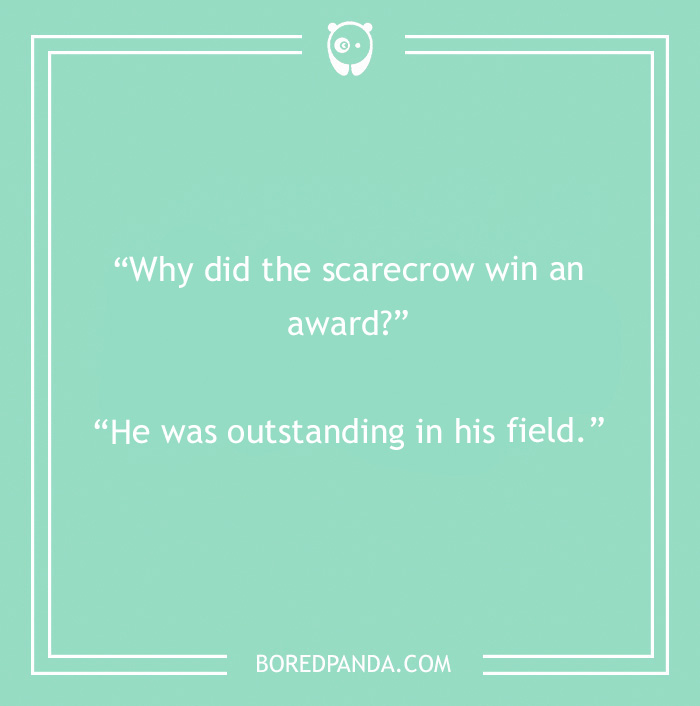 Why did the scarecrow win an award? He was outstanding in his field.
Why did the scarecrow win an award? He was outstanding in his field.
Classic dad joke energy
Why did Johnny throw his clock out of the window? Because he wanted to see time fly.
Guess the Moon’s a Hotspot
Why couldn't the astronaut book a hotel room on the moon? Because it was full.
Vampires and Allergies, Who Knew?
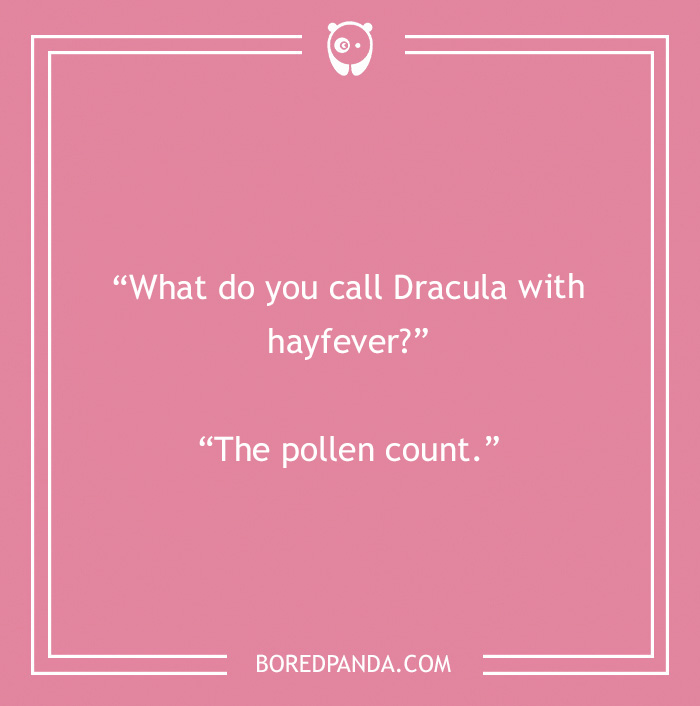 What do you call Dracula with hayfever? The pollen count.
What do you call Dracula with hayfever? The pollen count.
Bad Jokes That Are Not So Bad After All
You have got to agree; these puns and jokes were too good to be bad. We’re sure that at least a few cracked you up real good! Did you vote for the most terrible pun that was so bad that it completely aligned with your broken sense of humor? If not, do it right away! And don’t forget to let us know your favorite one in the comments.
If you enjoy humor that dances on the line between clever and silly, you might find these puns greatly amusing. They share a certain spontaneity with another type of comedic expression frequently enjoyed by many. There’s a specific kind of humor that celebrates this blend of fun and absurdity, and it’s called duck jokes.

 Dark Mode
Dark Mode 

 No fees, cancel anytime
No fees, cancel anytime 





















































































